Federal Court of Australia
Wreck Bay Aboriginal Community Council v Commonwealth of Australia (No 3) [2023] FCA 1132
NSD 70 of 2021 | ||
| ||
BETWEEN: | WRECK BAY ABORIGINAL COMMUNITY COUNCIL First Applicant JULIE ANN FREEMAN Second Applicant | |
AND: | COMMONWEALTH OF AUSTRALIA Respondent | |
DATE OF ORDER: | 8 SEPTEMBER 2023 |
THE COURT ORDERS THAT:
Referee’s Reports
1. Pursuant to s 54A(3)(a) of the Federal Court of Australia Act 1976 (Cth) (FCA Act) and r 28.67(1)(a) of the Federal Court Rules 2011 (Cth) (FCR), the reports of Mr Joshua Creamer dated 14 July 2023 and 17 August 2023 (Reports) be adopted, except to the extent that the Reports exclude from participation in the settlement claims by persons:
(a) who are not Aboriginal (including spouses who are not Aboriginal); and
(b) who were born on or before 1 September 2016 but who were under the age of 18 as at 19 June 2023.
Settlement Distribution
2. Pursuant to s 33V(2) FCA Act, the settlement approved on 19 June 2023 be distributed in accordance with the Settlement Distribution Scheme (SDS) in the Annexure to these orders.
Late Registrants
3. Pursuant to s 33V and/or 33ZF of the FCA Act any group member who has completed the registration form annexed to the orders dated 23 June 2023 and provided it to Shine Lawyers by 6 September 2023 is permitted to seek a benefit under the settlement of this proceeding, and is a “Late Claimant” for the purposes of the SDS.
Appointment of Administrator and Independent Counsel
4. Pursuant to ss 33V(2) and 33ZF of the FCA Act, Craig Allsopp and Caitlin Wilson of Shine Lawyers be appointed as Administrators of the SDS (Administrators) to act in accordance with the SDS subject to any direction of the Court, and to have the powers and immunities conferred by the SDS on the Administrators.
5. Pursuant to s 33V(2) and 33ZF of the FCAA, Mr James Mack and Mr Joshua Creamer be appointed as Independent Counsel of the SDS to act in accordance with the SDS subject to any direction of the Court, and to have the powers and immunities conferred by the SDS on the Independent Counsel.
Deductions from the settlement sum for the purposes of the SDS
6. Pursuant to s 33V(2) of the FCAA, the Court approves the following just deductions from the settlement sum only:
(a) the “Approval Costs” of up to $650,000 (inclusive of GST);
(b) the “Referee’s Costs” of $79,200 (inclusive of GST); and
(c) the “Administration Costs” in an amount of no more than $250,000 (inclusive of GST).
7. On or before 6 October 2023, the Administrators are to communicate to the Associate to Justice Lee:
(a) whether or not a reimbursement payment is sought by Mrs Julie Freeman, Mrs Vida Brown, Mrs Justine Brown or Mr James Williams;
(b) if so:
(i) the amount of the reimbursement payment sought by that person(s);
(ii) any materials relied upon by such person in support of the making of such a reimbursement payment to such persons;
(iii) any materials relied upon by the first applicant (WBACC) as to whether such payment(s) should be made;
(iv) any information available to the Administrators relevant to whether such a payment ought be made, and any draft order(s) to give effect to the making of the reimbursement payment(s) if allowed by the Court,
and the Court shall determine the amount (if any) of any such reimbursement payment on the papers.
Consequential Orders
8. All previous costs orders are vacated.
Potential application to opt-out
9. Any application by Mr Paul Ardler Snr (or persons referred to in his email to the Court dated 6 September 2023) seeking the leave of the Court to opt out of these proceedings is to be made on or before 6 October 2023.
AND THE COURT NOTES THAT:
10. The proceeding is to be dismissed with no order as to costs but such order for dismissal is not to be made until the Administrator provides to the Associate to Justice Lee a minute of order (containing a draft order dismissing the proceeding) together with written confirmation that the administration is complete.
Note: Entry of orders is dealt with in Rule 39.32 of the Federal Court Rules 2011.



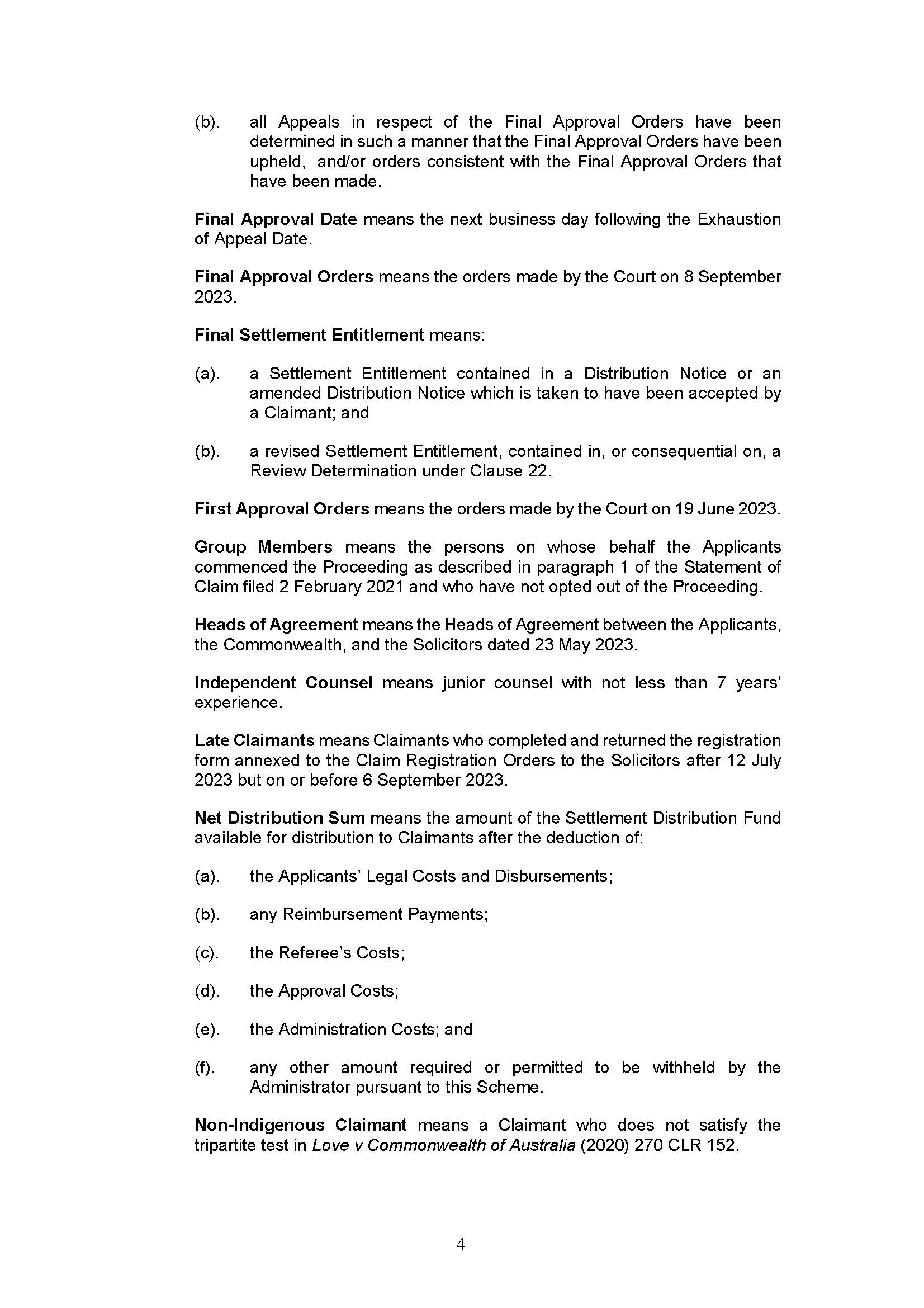

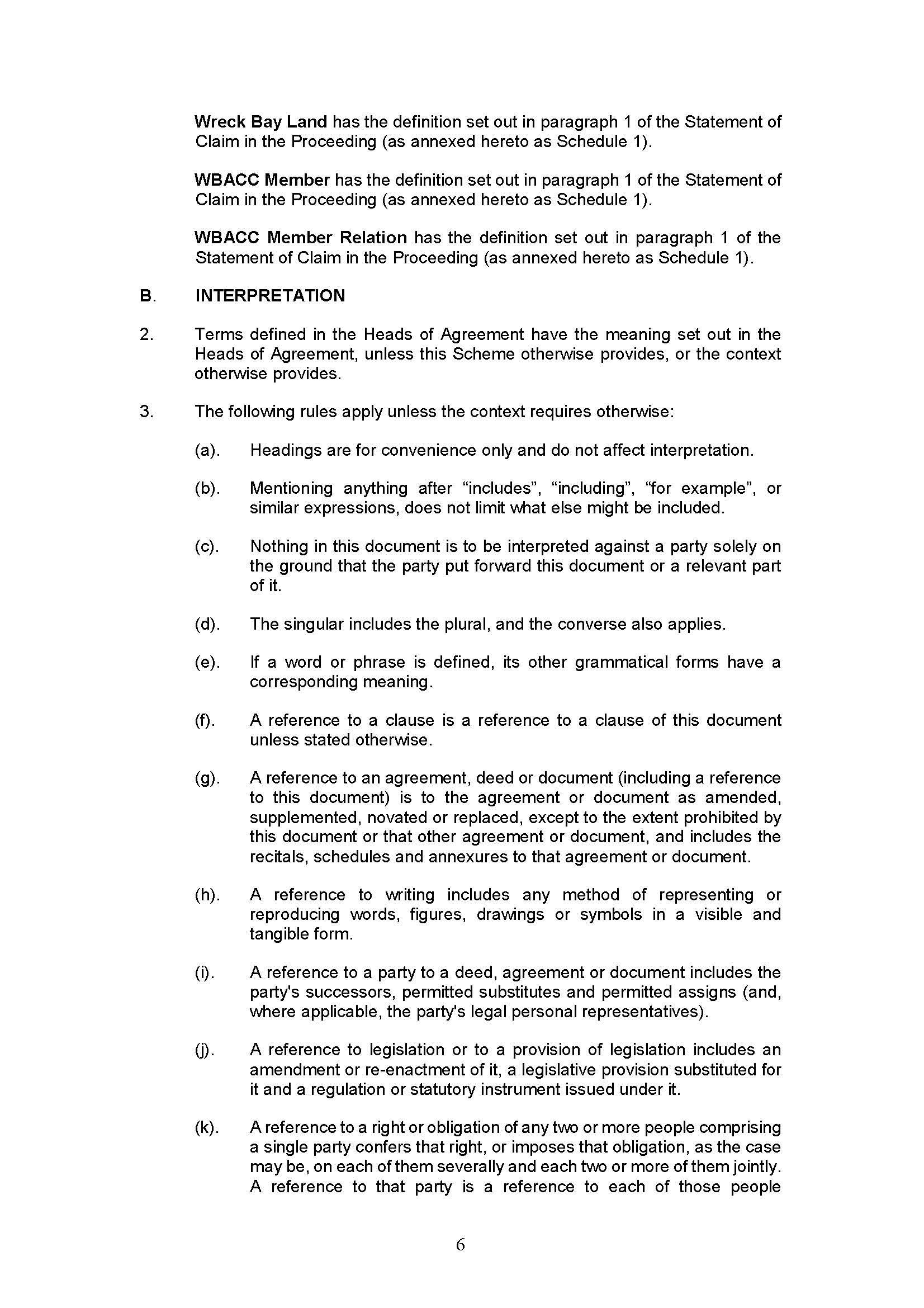
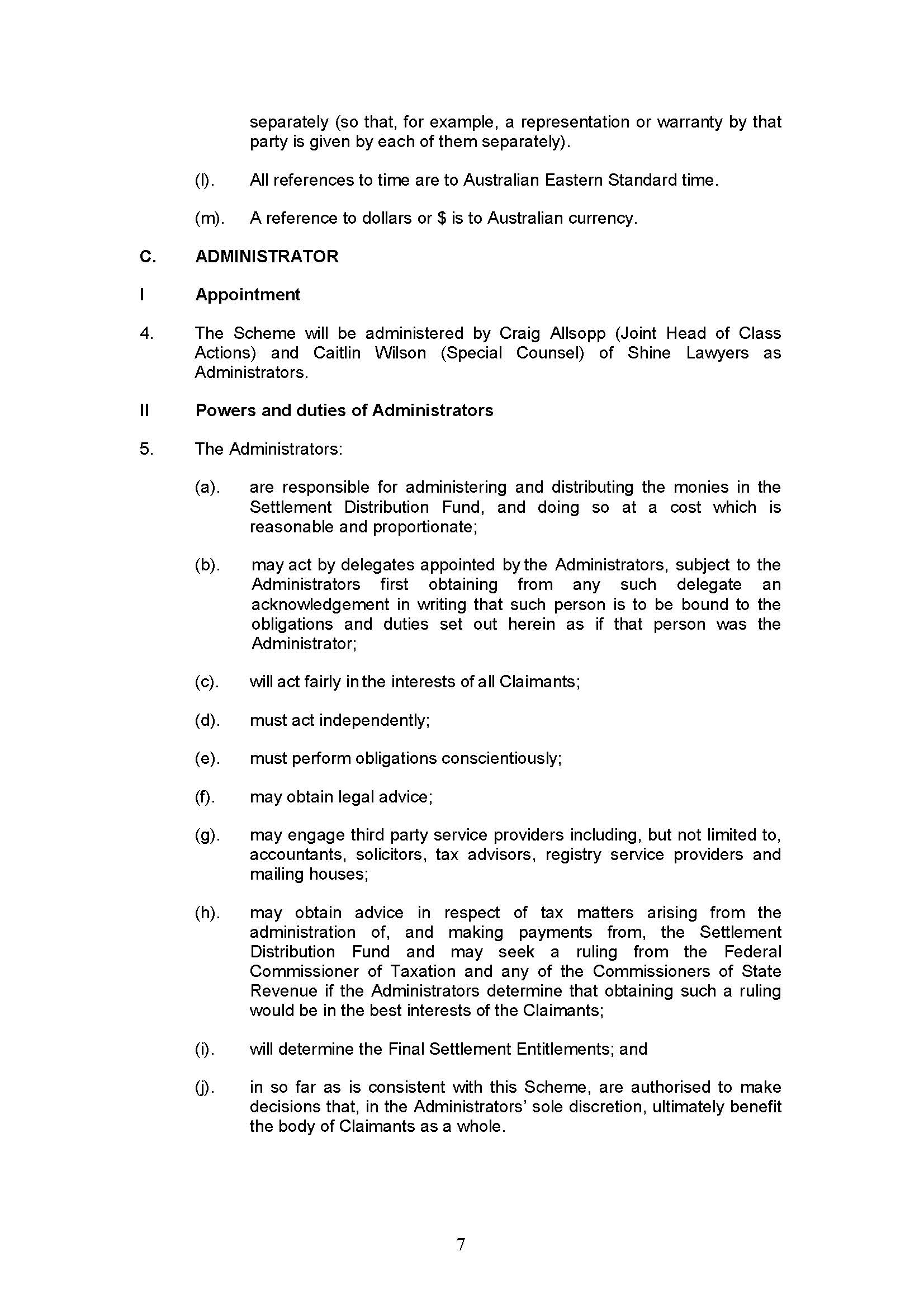
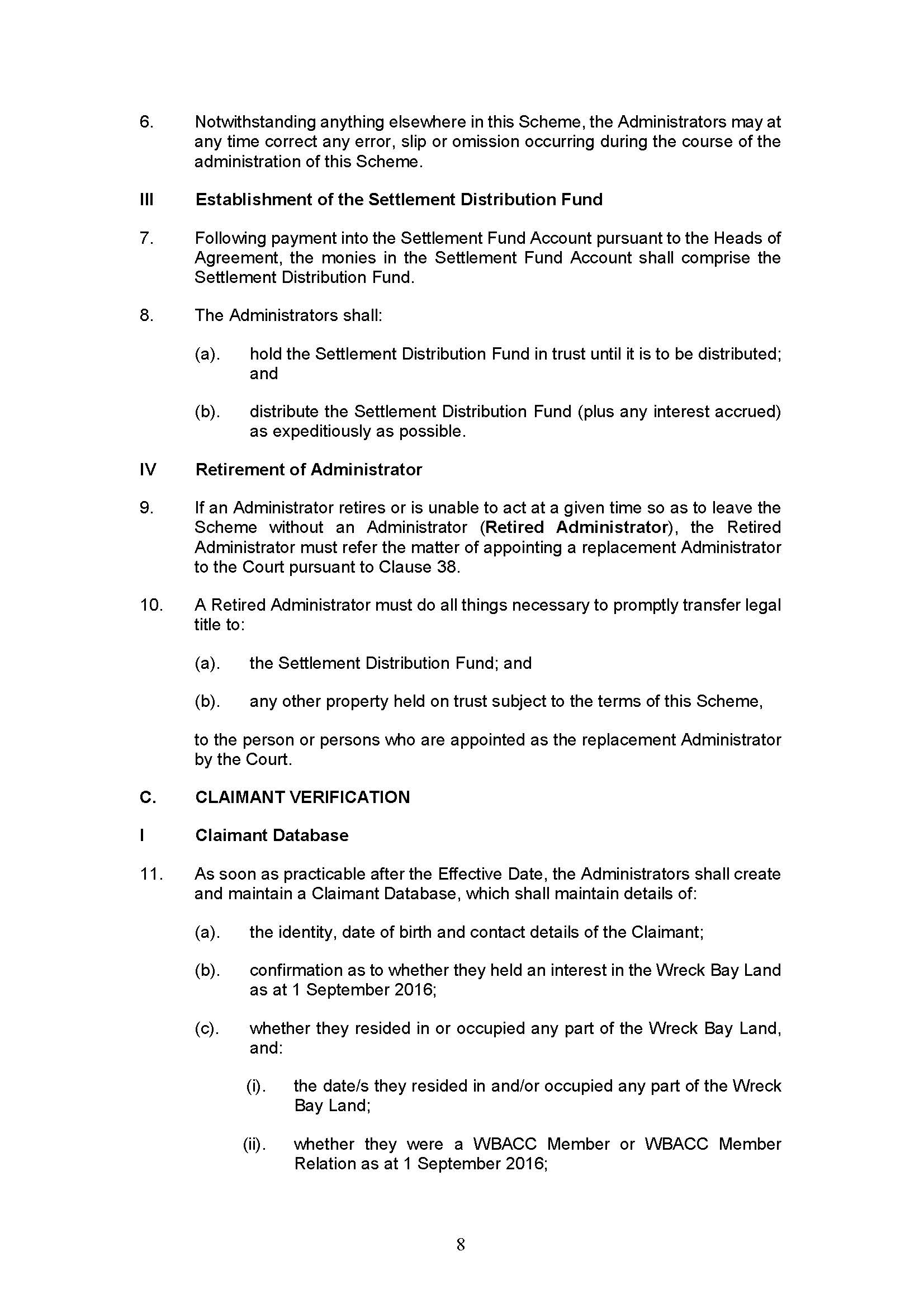
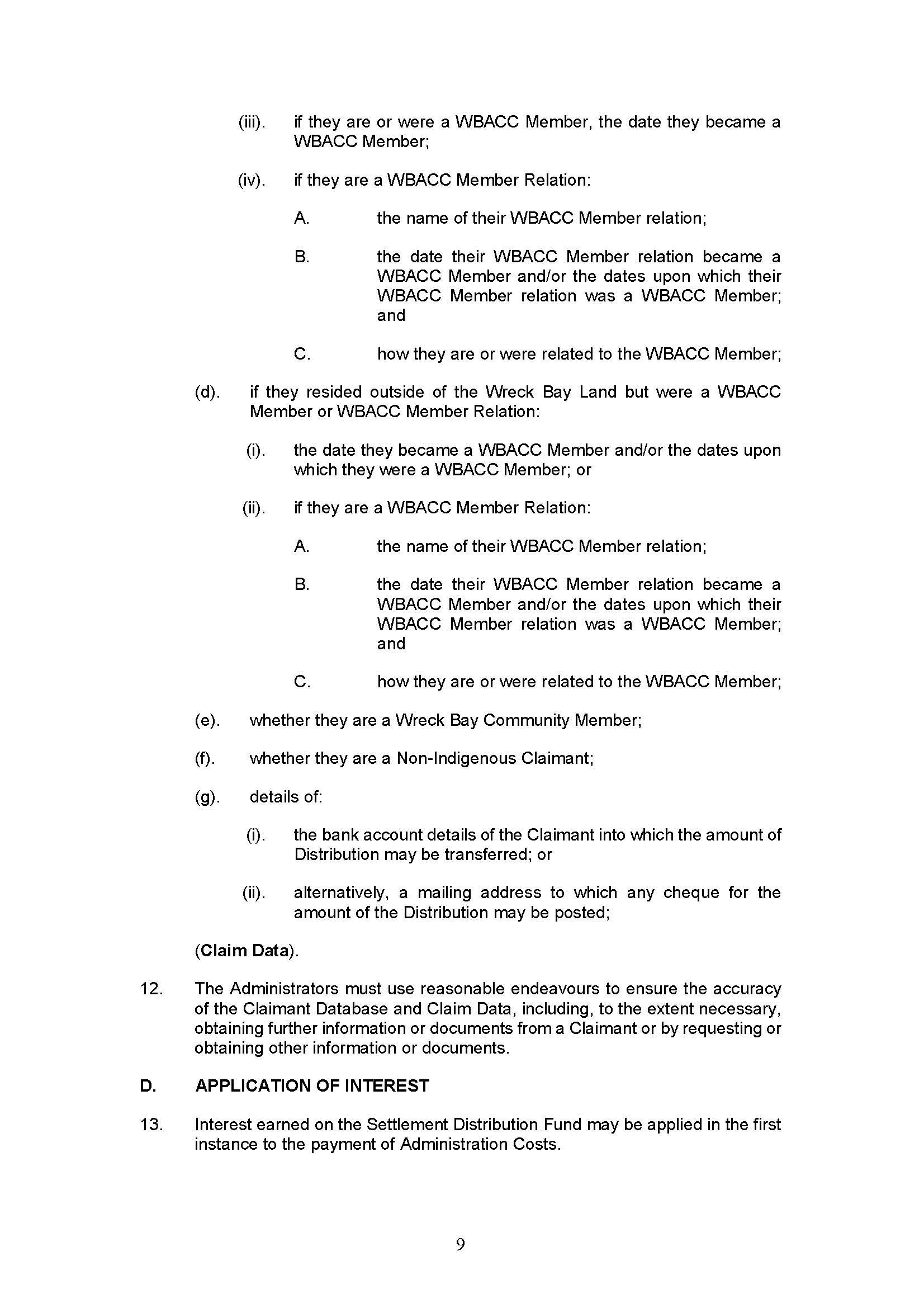
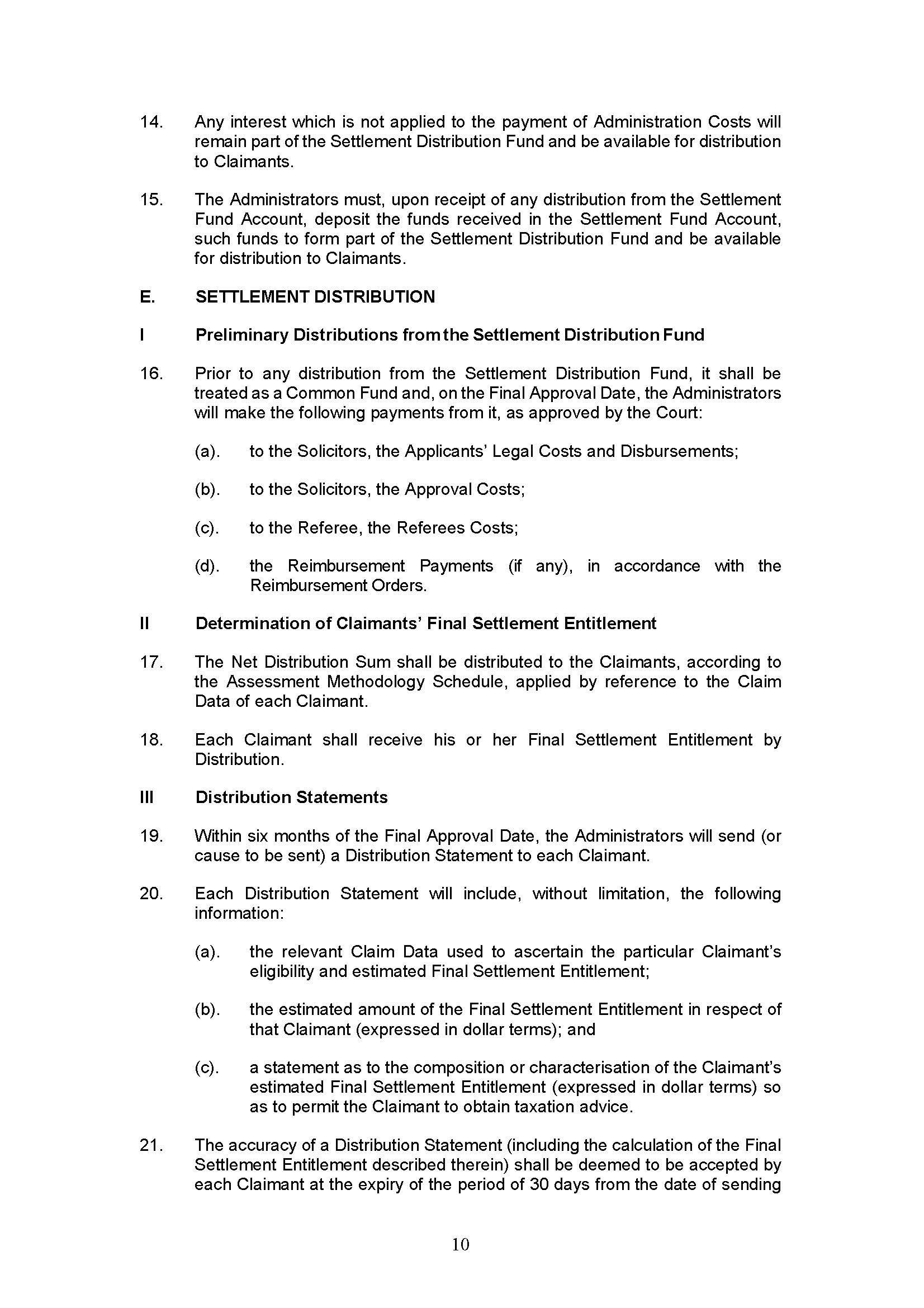
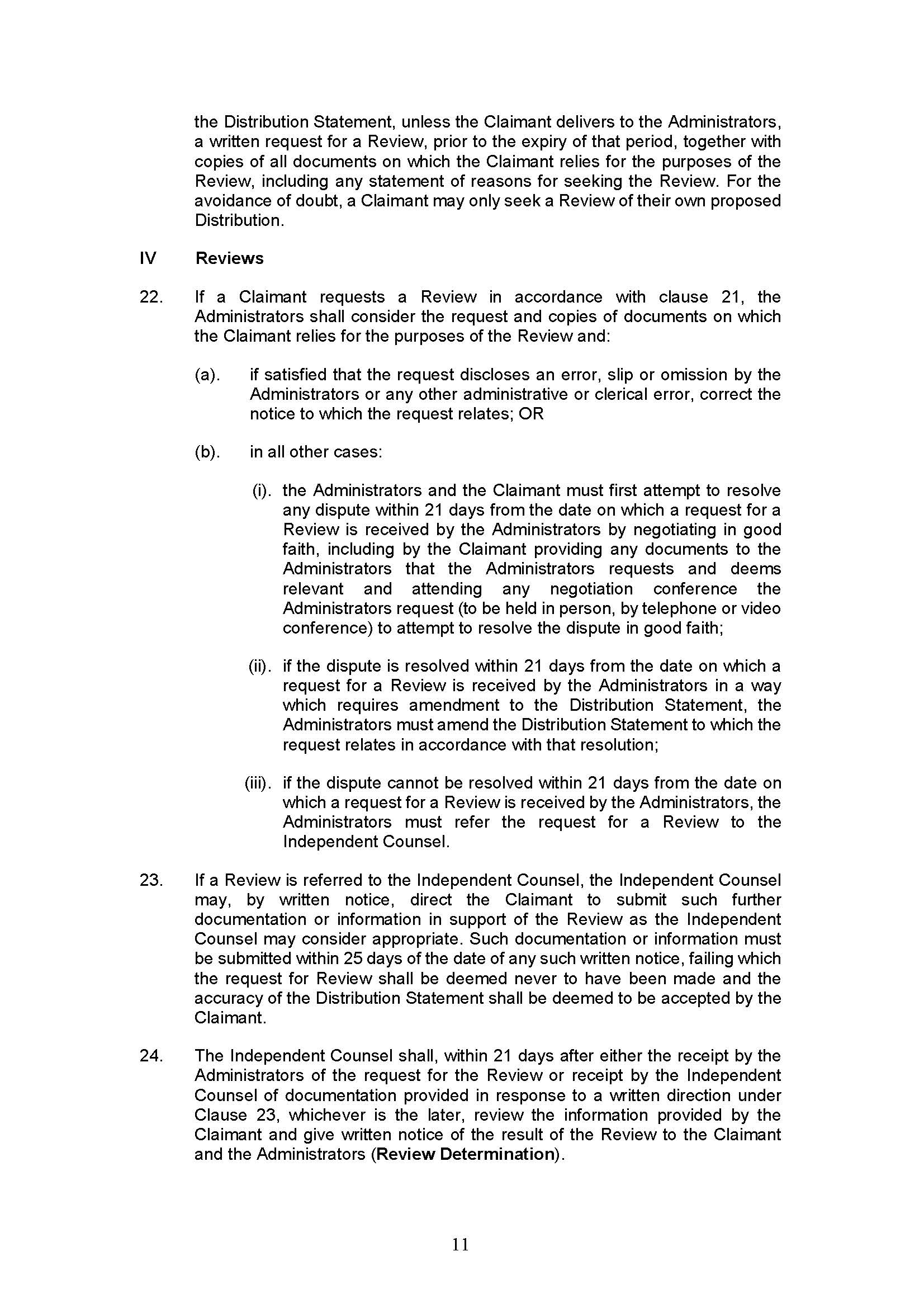
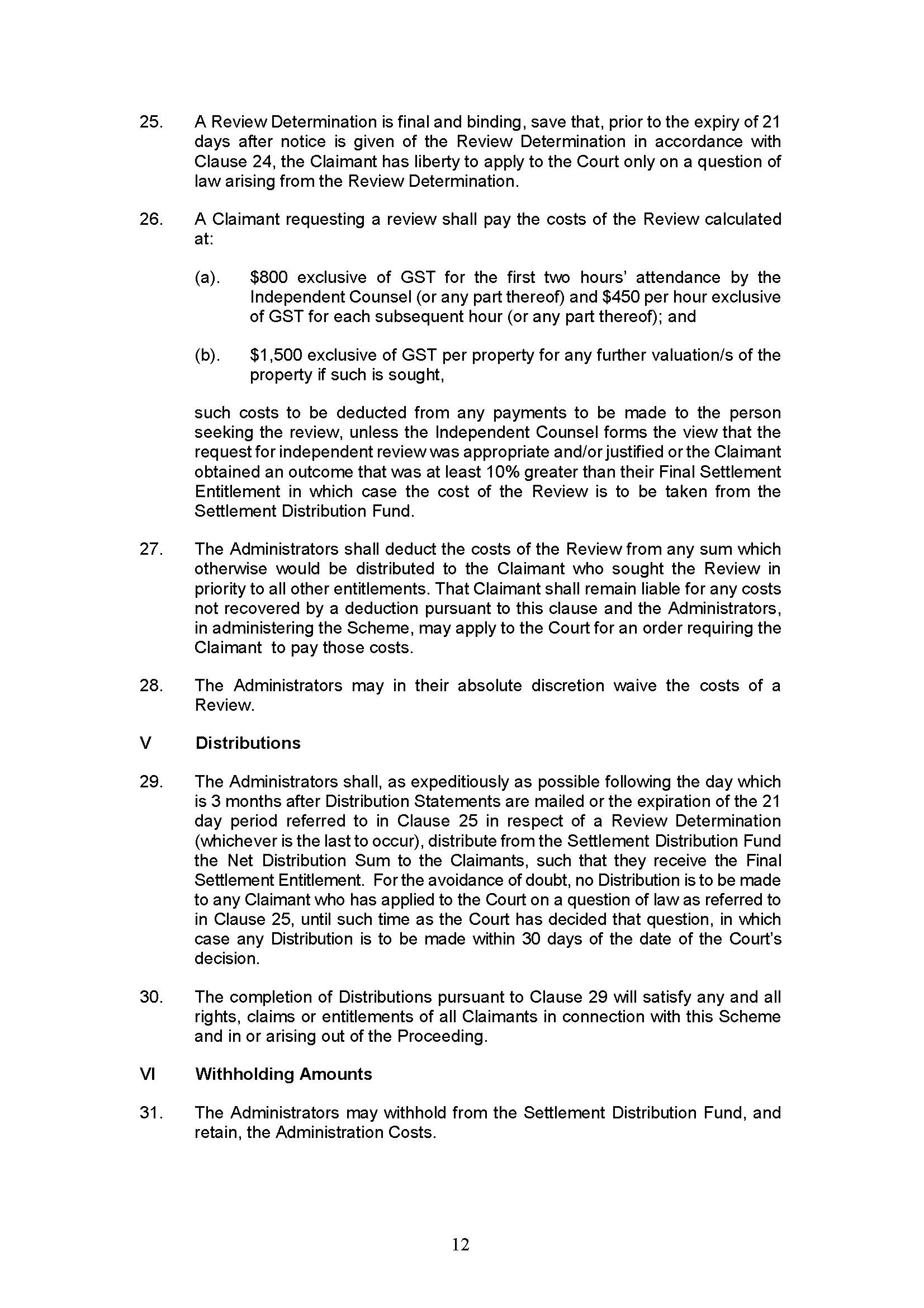
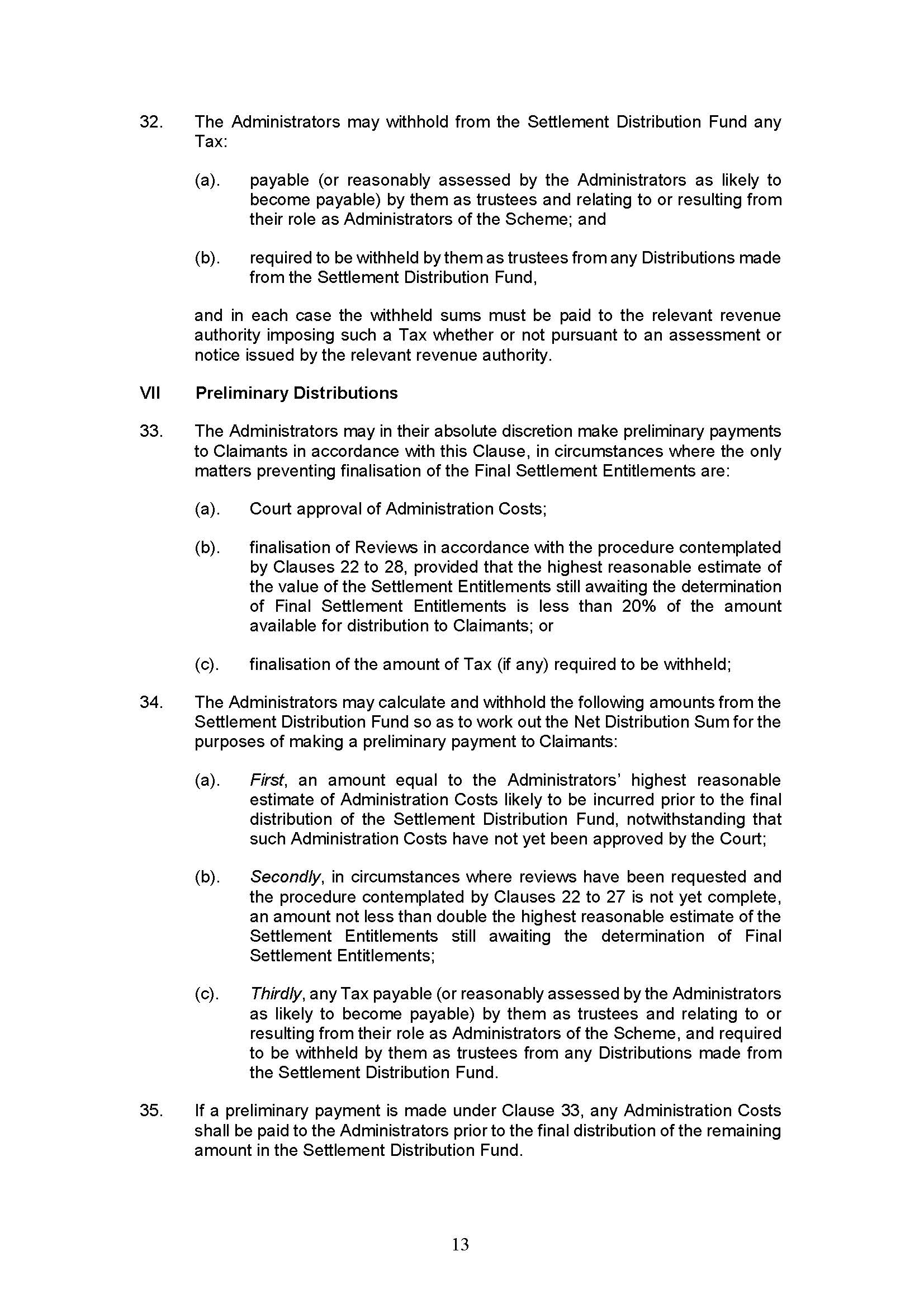
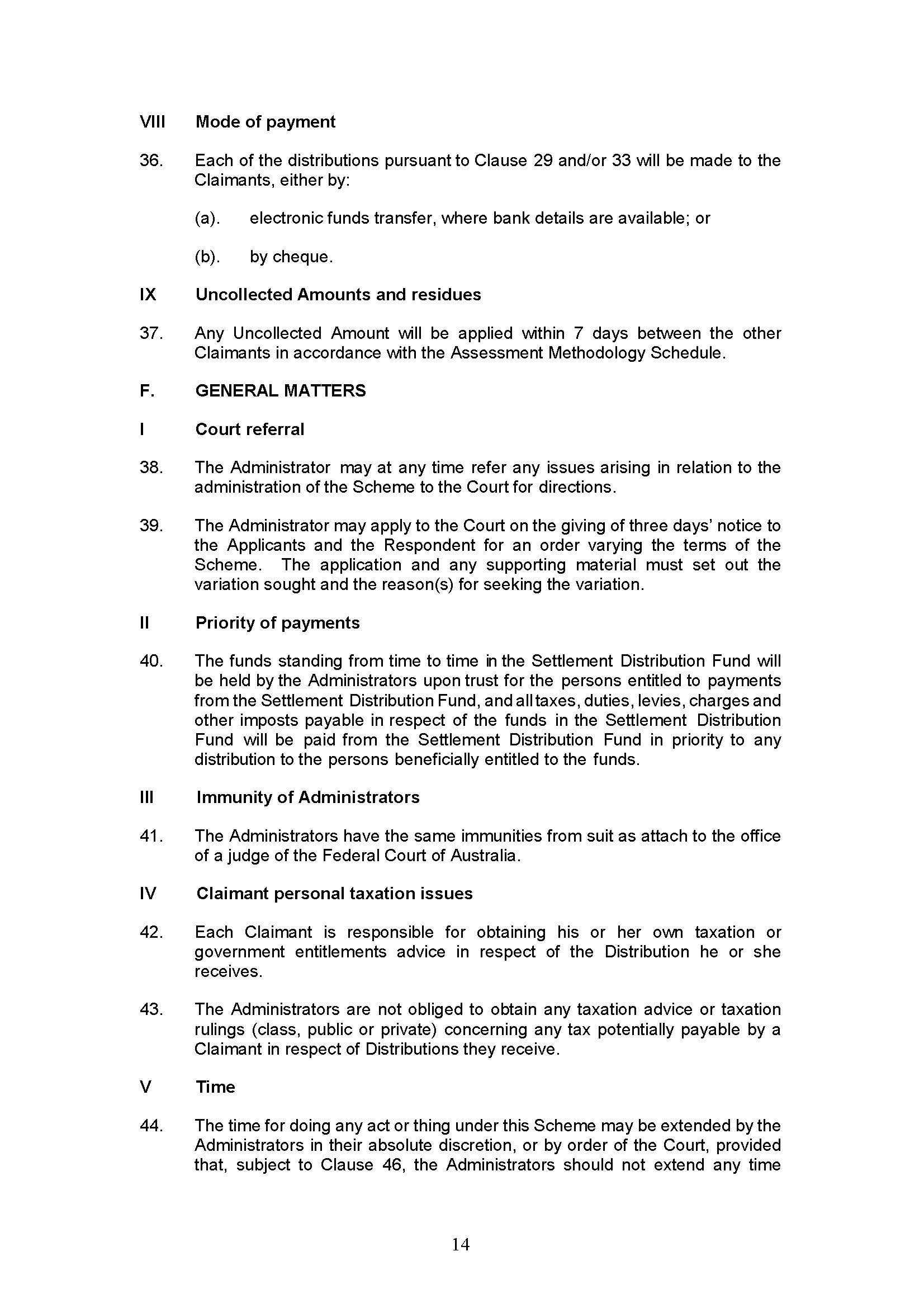
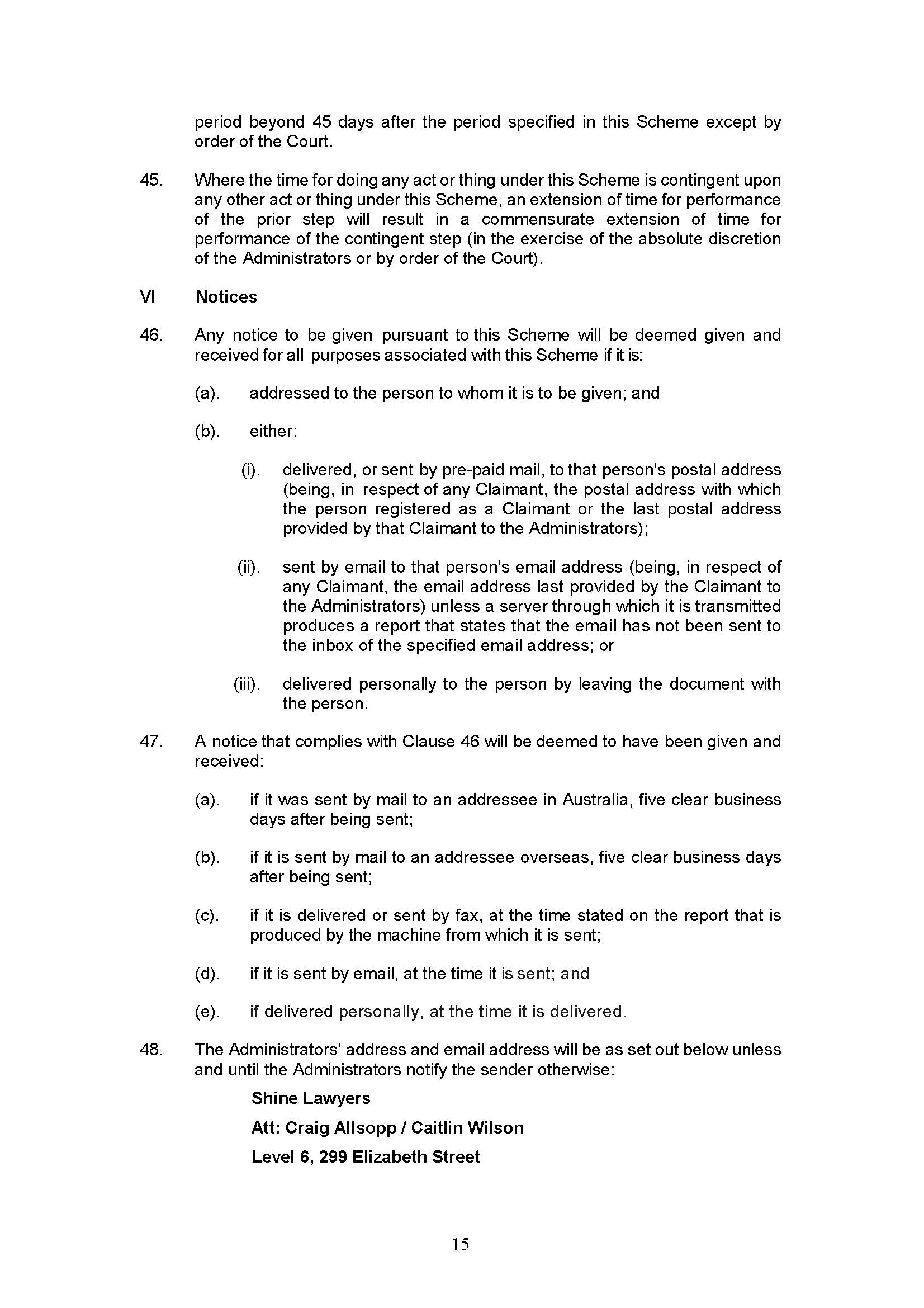
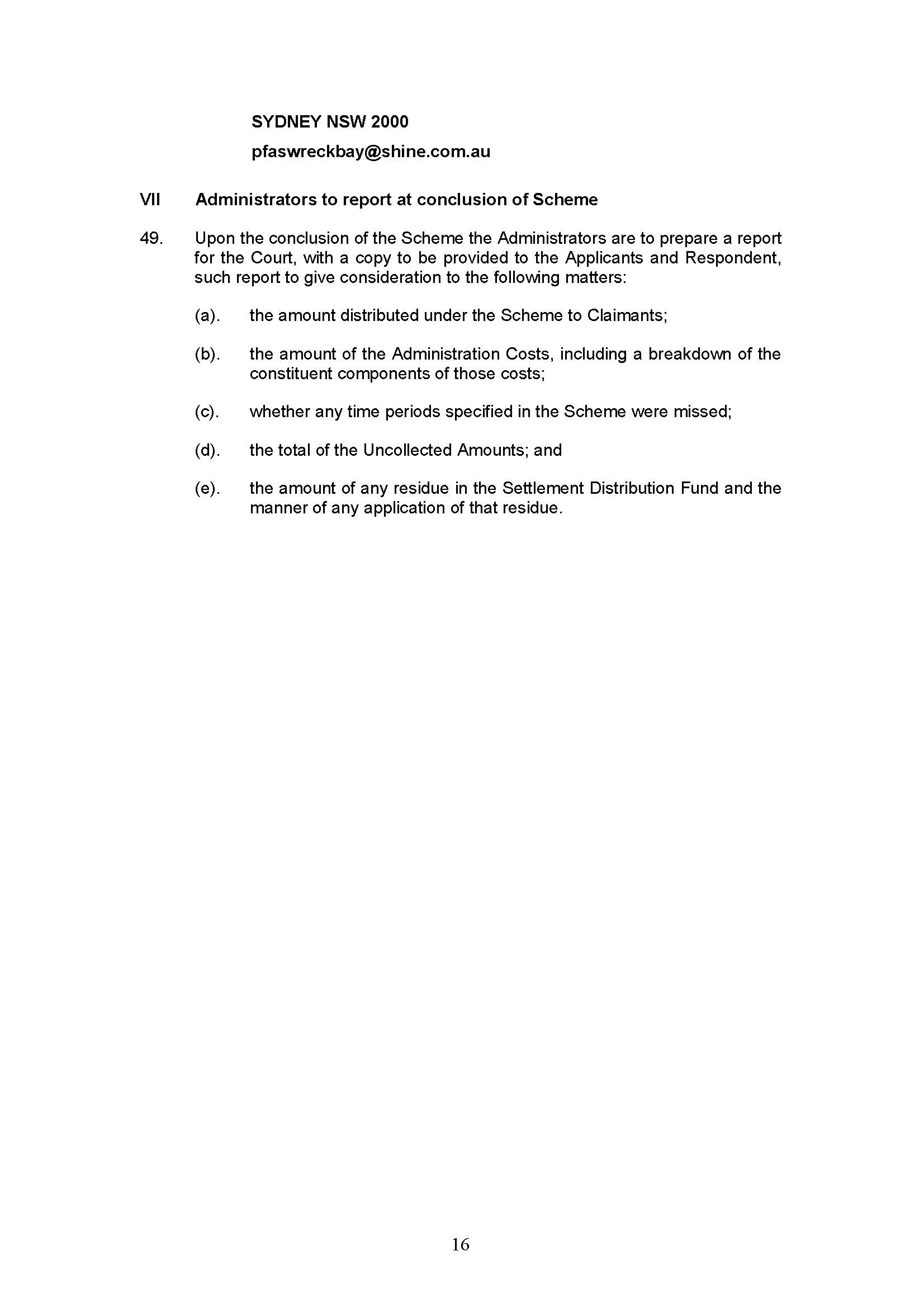
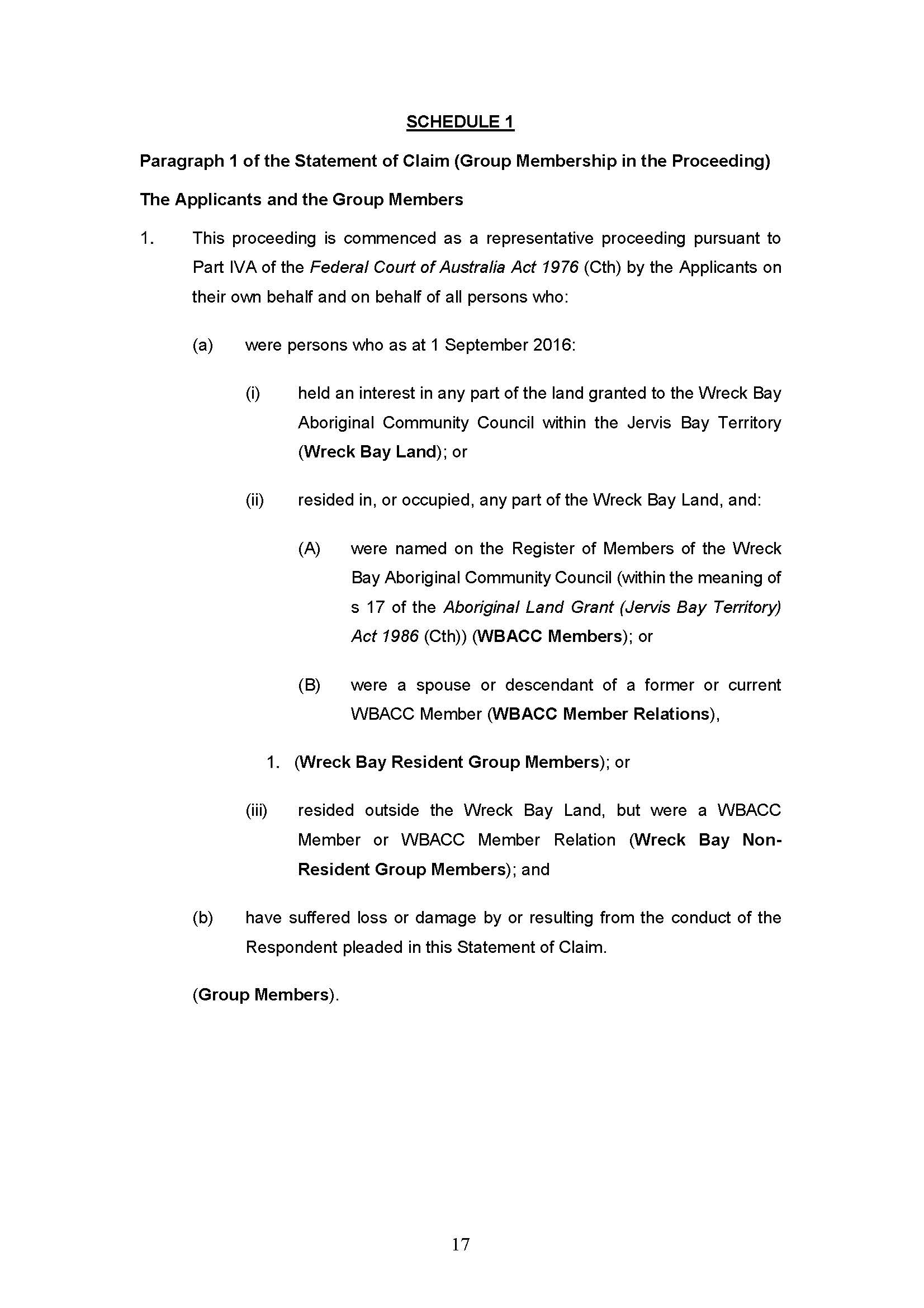
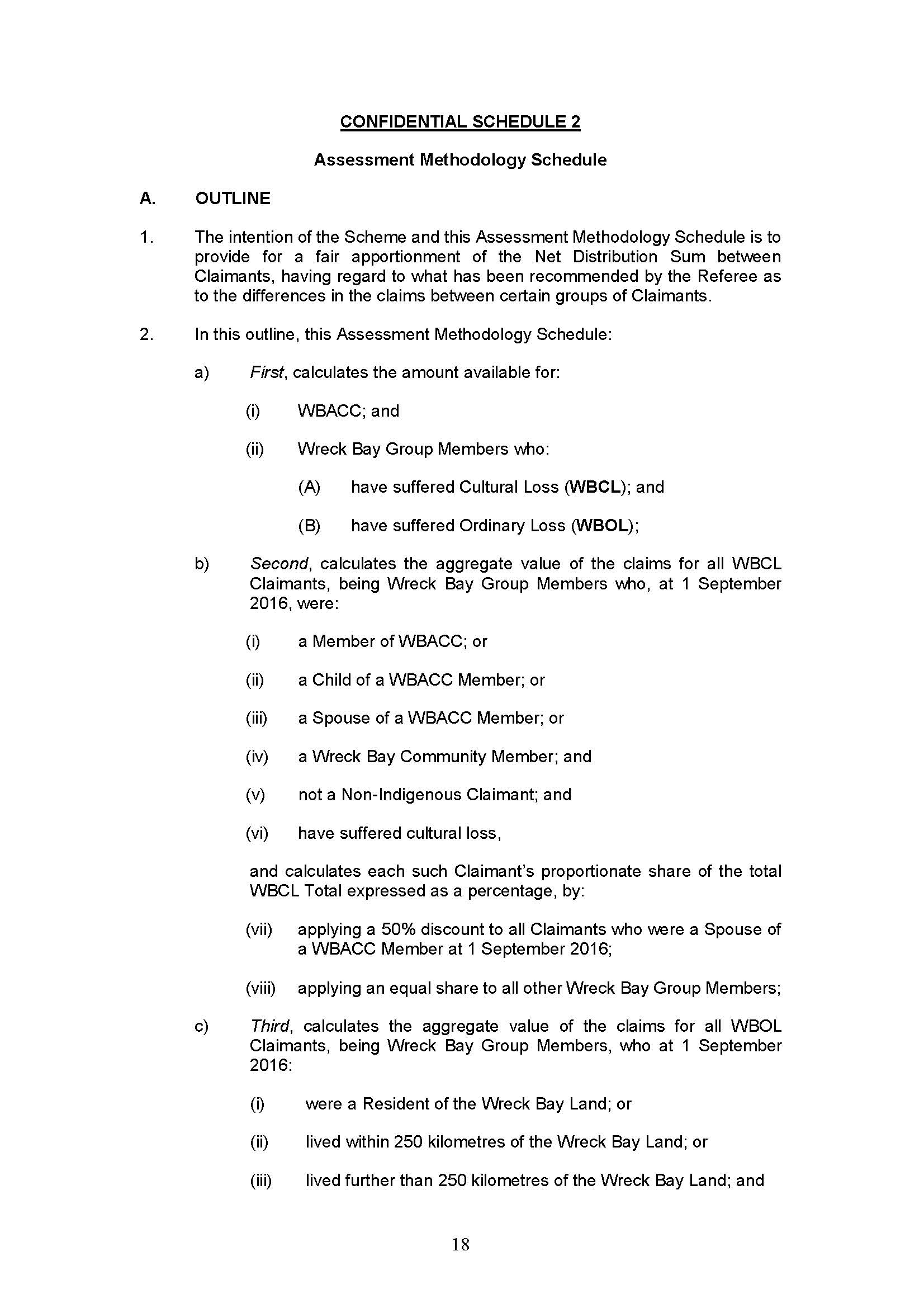
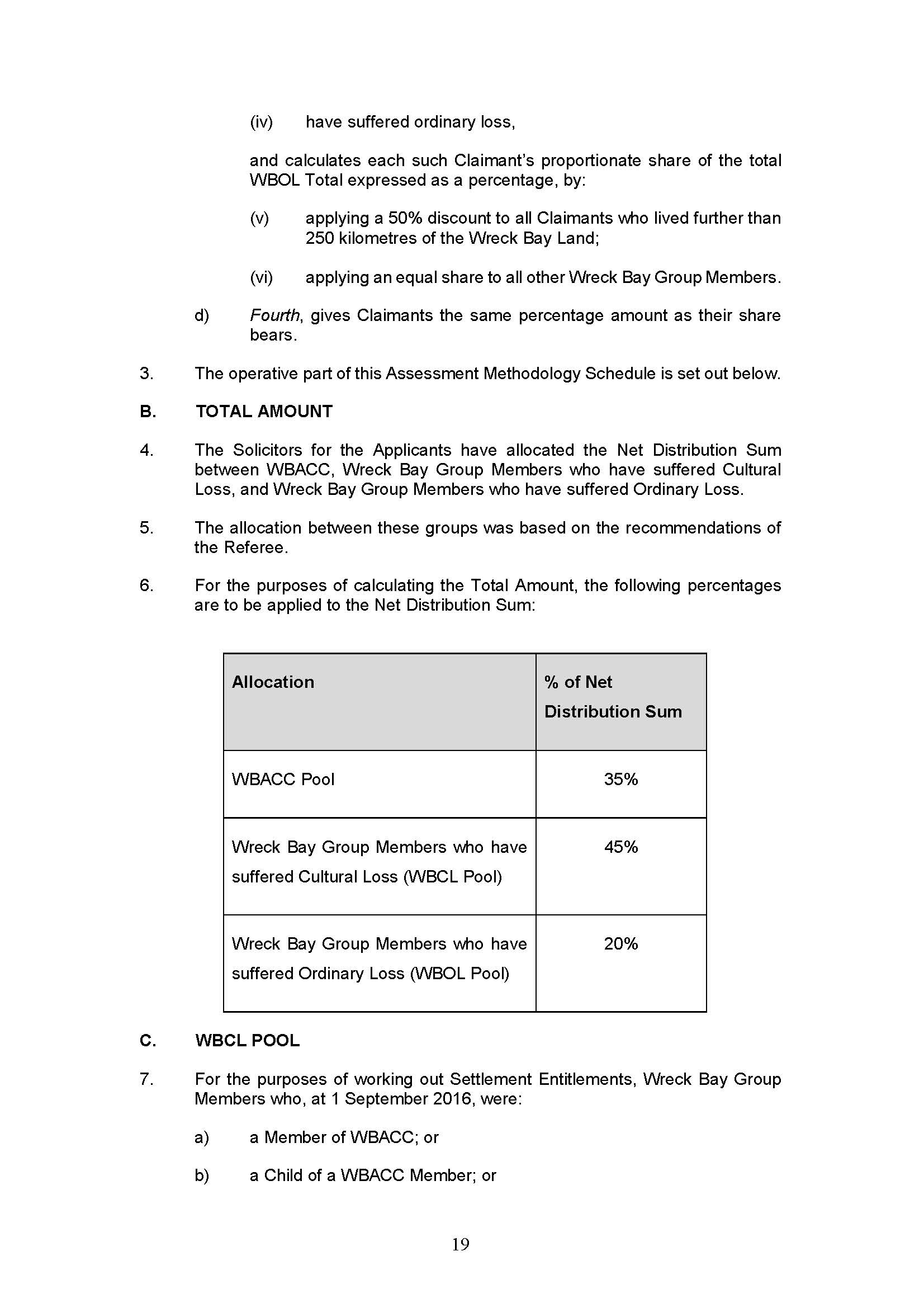
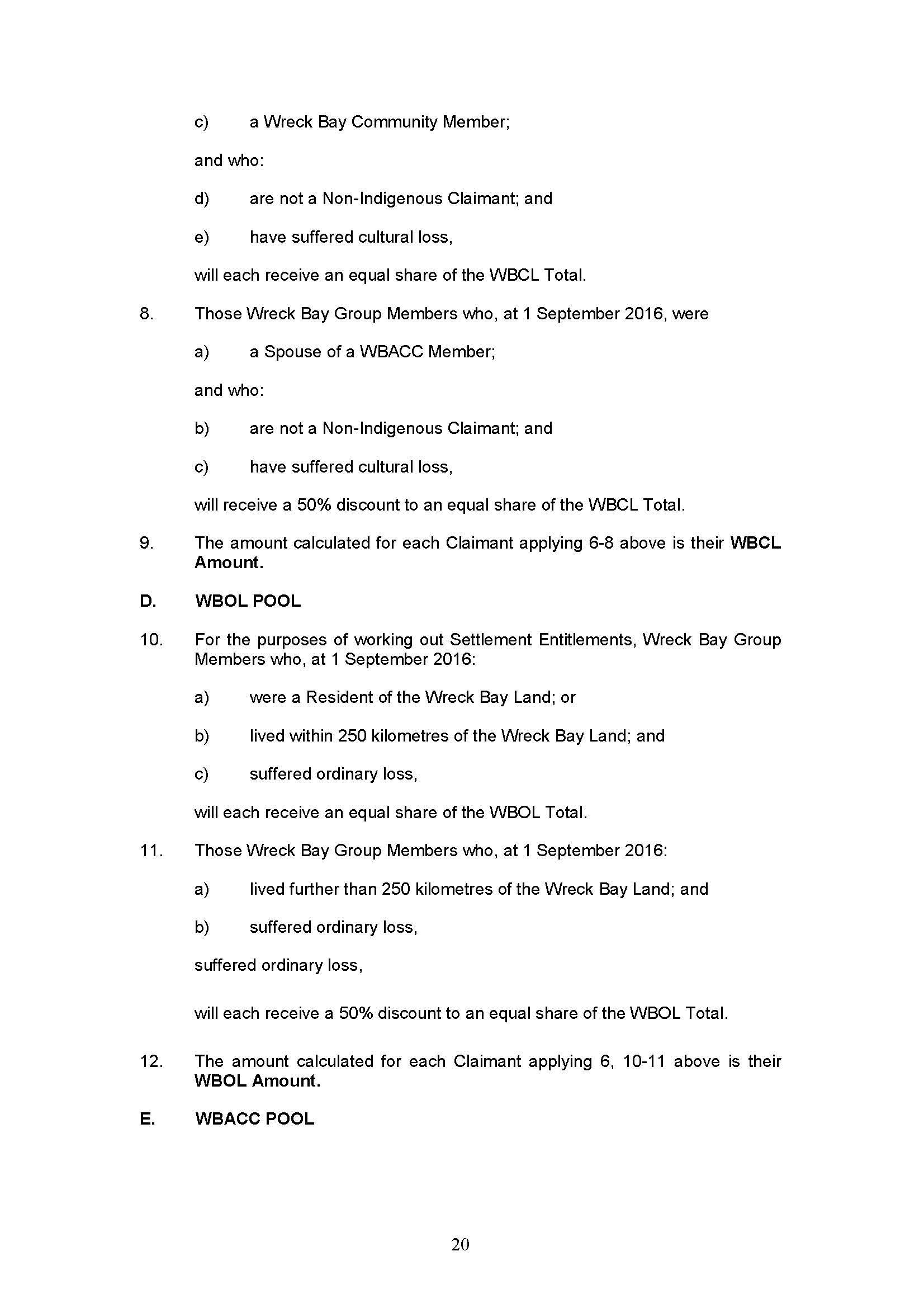
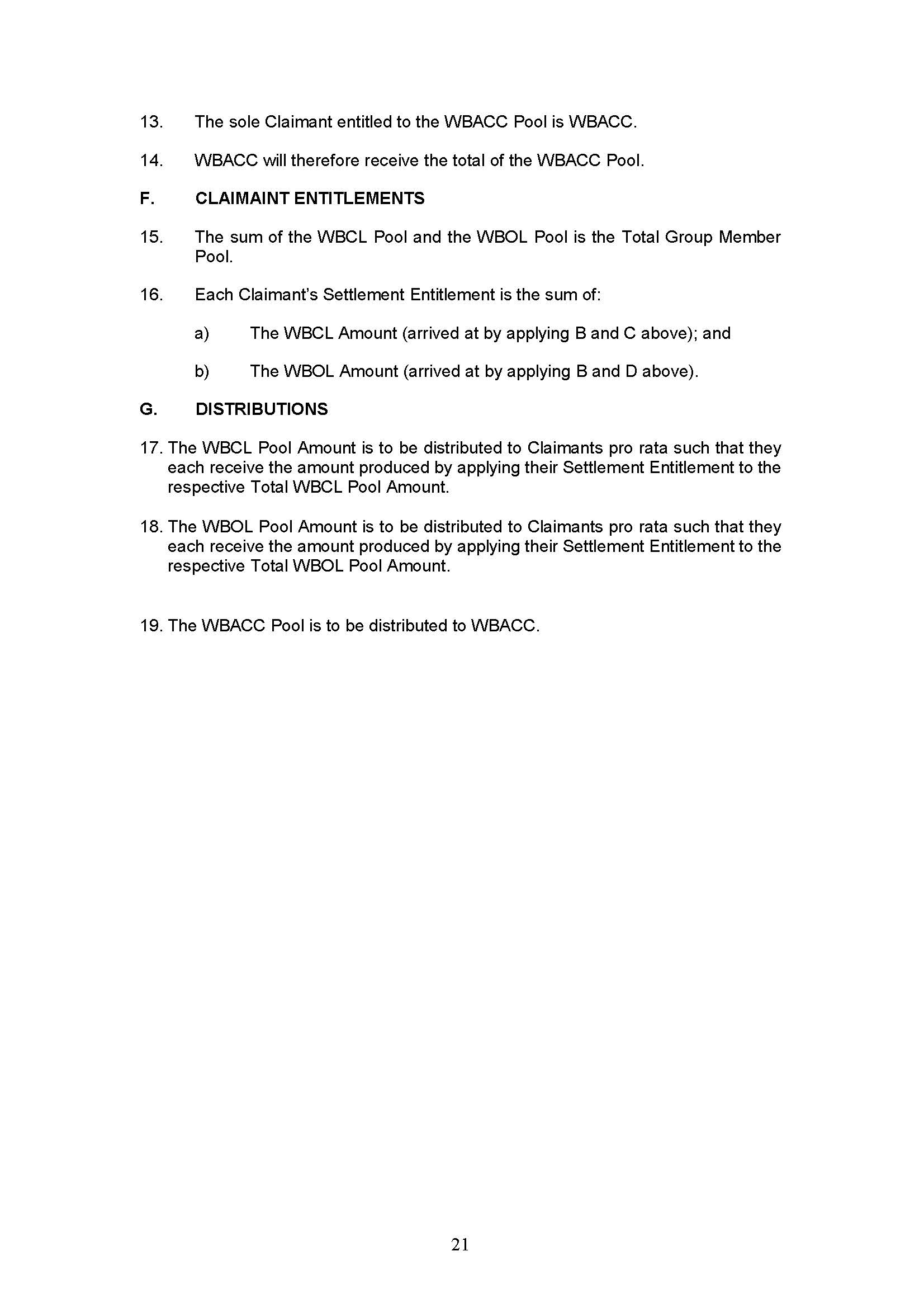
(Delivered ex tempore, revised from the transcript)
LEE J:
A INTRODUCTION AND BACKGROUND
1 These reasons assume familiarity with my two earlier judgments concerning the settlement of this class action, Wreck Bay Aboriginal Community Council v Commonwealth of Australia [2023] FCA 660 and Wreck Bay Aboriginal Community Council v Commonwealth of Australia (No 2) [2023] FCA 811.
2 On 19 June 2023, I approved the proposed settlement of this proceeding pursuant to s 33V(1) of the Federal Court of Australia Act 1976 (Cth) (FCA Act). The matter is now before the Court for the making of orders under s 33V(2) of the FCA Act for the just distribution of money paid under the settlement.
3 This proceeding was commenced as a class action on behalf of Wreck Bay Aboriginal Community Council (WBACC) and the second applicant, Ms Julie Ann Freeman, on their own behalf and on behalf of:
(1) all persons who as at 1 September 2016:
(a) held an interest in any part of the land granted to the Wreck Bay Aboriginal Community Council within the Jervis Bay Territory (Wreck Bay Land); or
(b) resided in, or occupied, any part of the Wreck Bay Land; and
(i) were named on the Register of Members of the Wreck Bay Aboriginal Community Council (within the meaning of s 17 of the Aboriginal Land Grant (Jervis Bay Territory) Act 1986 (Cth)),
(WBACC Members); or
(ii) were a spouse or descendant of a former or current WBACC Member (WBACC Member Relations); or
(c) resided outside the Wreck Bay Land, but were a WBACC Member or WBACC Member Relation; and
(2) have suffered loss or damage by or resulting from the conduct of the Commonwealth.
4 The following material is before the Court: the executed heads of settlement agreement; the proposed settlement distribution scheme (SDS) and accompanying proposed orders; two reports prepared by Mr Joshua Creamer of counsel (the referee appointed to inquire into and report to the Court in relation to the question of just distributions (referee)); two affidavits sworn by Mr Craig Allsopp, solicitor for the applicants; written submissions prepared by counsel for the applicants; and a bundle of correspondence sent by group members to the Court and the applicants’ solicitors.
5 These reasons concern the adoption of the referee’s reports and the assessment of a number of concerns canvassed in the objections provided by group members, primarily concerning eligibility and quantum.
B ADOPTION OF REFEREE’S REPORTS
B.1 Background to the Referee’s Reports
6 The referee was appointed to inquire into and report to the Court in relation to the question of just distributions from the settlement sum. Mr Creamer was appointed for his experience as a barrister (having practised for over 12 years) and his national practice in class actions and native title matters. He also has expertise in dealing with the complicated eligibility issues attending the settlement of this class action.
7 Mr Creamer prepared two reports: a “Class Eligibility Report” and a “Class Distribution Report”.
8 In preparing the Class Eligibility Report, the referee arranged for all group members to be made aware of the reference and provided with his contact details. He travelled to Wreck Bay for two days, during which he conducted a community meeting with approximately 50 community members in attendance. He also met separately with the board of the WBACC, Ms Freeman and community elders (Mr Jack and Mrs Eileen Hampton and Mr Jim and Mrs Norma Williams).
9 As to the Class Distribution Report, the referee travelled to Wreck Bay again and met with a number of community members, including Ms Beverly Ardler and Ms Justine Brown, who escorted him to a number of culturally significant sites. He reviewed a wide range of evidence as to cultural loss, including an anthropological report of Dr Alison Pembroke.
B.2 Adoption
10 I am grateful for the work undertaken by the referee and have determined to adopt both the Class Eligibility Report and the Class Distribution Report, subject to the qualifications explained in Section B.3.
11 There is no need, for the purposes of this judgment, to set out in any detail the well-established principles concerning the adoption of referees’ reports. I have previously explained the breadth of the discretion to adopt, vary or reject a report, in accordance with the principles set out by McDougall J in Chocolate Factory Apartments v Westpoint Finance [2005] NSWSC 784: see VoR Environmental Australia Pty Limited v Taset Inc (No 2) [2019] FCA 1094; (2019) 385 ALR 312 (at 320–321 [29] per Lee J).
12 It suffices to say the purpose of the reference process is to facilitate the partial resolution of litigation, as a transparent, efficient, and cost-effective alternative to a contested hearing. This purpose would be frustrated if the conclusions of a referee, formed following proper consideration of the issues and materials, were to be rejected without principled reason. Usually, rejection will involve demonstrating some manifest unreasonableness in the referee’s findings.
13 A further point should be made in the context of representative proceedings. The principles informing adoption must be informed by the circumstances in which the reference has been ordered and the way in which the report is to be used by the Court. Here, the protective and supervisory role of the Court is an important contextual factor in the exercise of the discretion. Ultimately, I am required to determine what is “just” as between the parties, and as between group members.
B.3 Two Qualifications
14 Leaving to one side the parts of the referee’s reports that call for no comment, the referee has recommended that, to receive a distribution from the settlement sum, group members must:
(1) be Aboriginal (Aboriginality restriction); and
(2) have reached their majority as at 19 June 2023 (age restriction).
15 It seems to me the imposition of restrictions of this kind would operate an unfairness on some group members. I must have regard not only to the gross settlement figure, but also to considerations of fairness and reasonableness as between group members. The applicants represent all group members, not a subset of them. If it was thought that only a smaller pool of group members should be involved in the class action, then this is a matter that should be addressed by way of an application for leave to amend the group definition pursuant to s 33K of the FCA Act. Those commencing the claim had a choice in drafting the group member definition and did not elect to restrict the class as is now proposed.
16 As to the Aboriginality restriction, this would only affect persons who are non-Aboriginal spouses of Aboriginal persons who are either WBACC Members or WBACC Member Relations. I am informed from the bar table today that we are dealing with only a “handful” of individuals. Those individuals, however, have distinct claims which are represented in the proceedings for “ordinary loss of use damages”, namely damages for inability to use and enjoy land which do not involve any claim as to cultural loss.
17 In settling class actions, it is not unknown for there to be a small subset of group members who have a claim which can be objectively characterised as hopeless. For example, there may be a small subset of group members whose claims are statute barred or destined to fail because of some matter that has become apparent during the course of the litigation. If a case was to settle in those circumstances, it could well be fair and reasonable and in the interests of all group members that those group members receive no distribution because to provide a distribution to those persons would be to affect adversely the interests of other group members.
18 But this is a world away from the present circumstances. There is no basis to suggest the claims for ordinary loss of use damages are somehow weaker than claims for damages for cultural loss. Indeed, the former do not suffer from some of the legal obstacles to recovery faced by the latter. Accordingly, I do not believe it is appropriate or fair that this restriction exist and to impose it would be contrary to my protective role towards all group members.
19 Further, and similarly, I do not believe there should be an age restriction. The group definition did not exclude minors (as long as they were persons who had been born prior to 1 September 2016). If the suggested age restriction was to be adopted, the solicitors for the applicant presently estimate that 104 registered group members would be ineligible to receive compensation on the basis they had not reached their majority as of 19 June 2023. Whatever way one looks at it, these people are group members and, it seems to me, they should be compensated, absent compelling arguments to the contrary. Many of these individuals will only have claims for cultural loss and, as the applicants’ solicitors point out, there is an intergenerational impact to the loss alleged in this case. Indeed, as the referee stated in the Class Eligibility Report (at [40]), “[f]uture generations of descendants of today’s Wreck Bay community will feel loss of connections and practices”.
C ISSUES RAISED BY GROUP MEMBERS
20 I have had the opportunity of reading and considering all communications sent to the Court and the applicants’ solicitors by group members. On review of this material, it is immediately apparent this is a settlement approval application which has received a higher degree of scrutiny than almost any other of which I am aware. Of approximately 980 group members, 360 have made individual enquiries in relation to the circumstances of their claim. This, and the very close community consultation process, satisfies me the process has been transparent and consultative, in no small part due to the recent activities of both the applicants’ solicitors and the referee.
21 I am satisfied that, subject to the matters I have resolved above and noted below, the SDS is a just and sensible scheme.
C.1 Register of Members
22 It was suggested by certain group members that persons who were eligible for membership but were not registered as members of WBACC at various times should be excluded from the settlement. I can see no reason to do so, nor can I see any reason to doubt the referee’s conclusion there should be no geographical limit placed on eligibility.
C.2 Individual Assessments
23 A number of objections called for the assessment of individual claims. Any such process would involve significant costs being incurred, which would not be justified nor proportionate. Settlements of this kind often involve some degree of “rough and ready” distribution, necessary for the realisation of the best outcome for all group members.
C.3 The Position of Mr Ardler
24 Mr Paul Ardler sent a very detailed email to the Court, expressing concerns in relation to his commercial fishing business. Mr Ardler advised that he and his family are the sole owners of the last commercial fishing business in the Wreck Bay area and still practise traditional cultural methods of fishing. He expressed concern his claim for business damages would be lost.
25 I am informed on this application that a distinct claim for business losses proposed by Mr Ardler, or some entity associated with him, had not been brought to the attention of the solicitors until today and, in any event, was not the subject of discussions between the parties when it came to resolving these proceedings.
26 In these unusual circumstances, I will provide Mr Ardler a period of one month in which to obtain legal representation and form a view as to whether or not it is appropriate he make an application to seek leave to opt-out. By taking this course, I am not foreshadowing that such an opt-out application will necessarily be successful; it will, of course, be determined on its merits. But, on the material presently before me, I am not in a position to understand whether or not the claim proposed belongs to Mr Ardler or some other entity, and whether, after obtaining appropriate legal advice, Mr Ardler would be satisfied it is better for him in the long run to participate in the settlement or to seek to agitate a broader claim.
C.4 The Identity of Independent Counsel
27 The SDS, as currently drafted, proposes that either Mr Creamer or another barrister who has experience in dealing with settlement distribution schemes, Mr James Mack, be appointed as independent counsel. Apparently, I am told from the bar table that some issue may have arisen between Mr Creamer and various of the group members in his role as a referee. I think the appropriate course is to appoint both Mr Creamer and Mr Mack so they can work together and, if there is any particular reason why one or other should do particular aspects of work, then I am sure that, in consultation with the administrator, that can be worked out in a sensible manner.
C.5 Costs
28 The costs incurred to date are appropriate given the amount of work required to reach this stage. I also consider the referee’s costs are proportionate to the extensive work performed.
29 Going forward, there is the benefit of a cap on legal and administrative costs.
C.6 Reimbursement Payments
30 A conflict has arisen between the two applicants in relation to reimbursement payments.
31 WBACC does not seek any reimbursement payments to be made to either its joint applicant, Ms Freeman, or any other group member who has participated in prosecuting the case. By contrast, Ms Freeman seeks an additional reimbursement payment for herself and considers that such a payment might be appropriate for other group members, being Mr James Williams and Ms Vida Brown.
32 No amount has been proposed, and it is presently unclear whether, for example, Ms Brown would maintain a later application in the event I was to approve payment being made to Ms Freeman or Mr Williams. It is fair to say that, because of the conflict between the applicants, the material one would usually see on such an application is not present before me.
33 I propose to defer consideration of this issue, which need not be resolved until the final distribution, which I anticipate will occur in about December of this year.
34 My preliminary view is a relatively modest amount should be paid to those who have performed exceptional service in the maintenance of the proceeding, something which is probably best judged by the applicants’ solicitors rather than myself. Having said that, I am also happy to receive any representation from the WBACC as to why no payment should be made.
35 I think the appropriate course is for the scheme administrator to indicate to me, through my Associate, whether or not an amount is pressed, and for WBACC to indicate to my Associate their reasons for opposing the payment of such an amount. Given I do not wish for any further legal costs to be expended in relation to this matter, I will deal with such an application on the papers.
C.7 Late Registrations
36 Finally, I propose to accept 39 registrations received after the registration deadline of 12 July 2023, which have been assessed as being genuine late registrations. I am told the inclusion of these late registrants will not materially affect the entitlements of group members as outlined in the settlement distribution notices. Sensibly, the amounts provided for in the notices included a “buffer” for late registrations and other like issues. Accordingly, those 39 persons should be treated as “claimants” for the purposes of the SDS.
D CONCLUSION AND ORDERS
37 For these reasons, and the reasons set out in the submissions provided to me, I will make the orders sought and invite the applicants to provide revised short minutes of order to reflect these reasons.
I certify that the preceding thirty-seven (37) numbered paragraphs are a true copy of the Reasons for Judgment herein of the Honourable Justice Lee. |
Associate:
Dated: 21 September 2023




